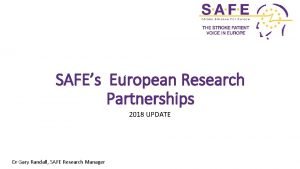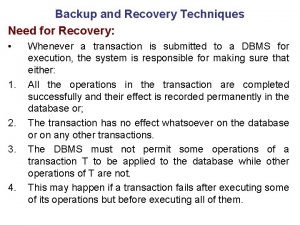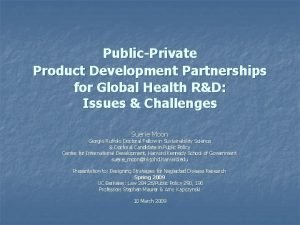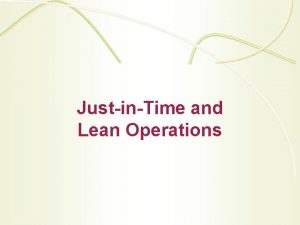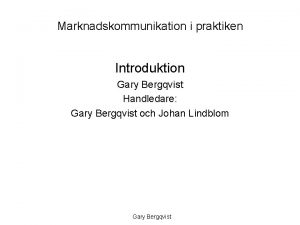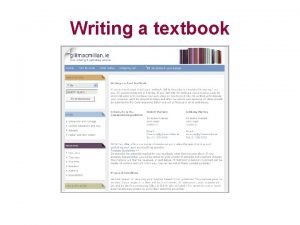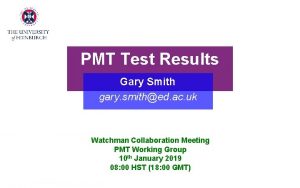SAFEs European Research Partnerships 2018 UPDATE Dr Gary













- Slides: 13

SAFE’s European Research Partnerships 2018 UPDATE Dr Gary Randall, SAFE Research Manager

What we do • The Stroke Alliance for Europe (SAFE), participates in EU funded research projects. • Our involvement in research allows us to stay up-to-date on the latest research breakthroughs and promising treatments and to ensure that this potential live-saving knowledge reaches patients and healthcare professionals all across Europe. • Our major strength is dissemination

We are a member of 5 projects

What is common in stroke and dementia? • SVD refers to small vessel disease. It affects small arteries in the brain and accounts for most cases of haemorrhagic (bleeding) stroke, a quarter of ischaemic (blockage) strokes, and contributes to at least 40% of dementia cases. • There are currently no treatments for SVDs and they are only partially understood. • This new project looks at the common factors in multiple SVDs and will try to develop new treatments for the particular diseases that lead to dementia and stroke.

Imaging Studies in Humans We will recruit 1200 patients with stroke caused by genetic or rare SVDs Plus 450 patients with dementia caused by SVD We will use the most powerful MRI scans possible to get more detail on blood flow and brain structure than ever before in these patients. ZOOM@SVDs The 3 studies are INVESTIGATE-SVDs TREAT-SVDs and all are recruiting well.

TENSION Trial: Is catheter treatment also effective in severe stroke? • When stroke is treated by thrombectomy, blood clots are removed from the arteries of the brain with the help of a mechanical device in order to rebuild the blood circulation in the damaged area. So far, this therapy is only used regularly in specialized centres if the stroke had not already caused significant damage to the brain. • The research project TENSION, under the leadership of researchers of the Universitätsklinikum Hamburg-Eppendorf (UKE), will show whether patients affected by a severe stroke with already extended brain damage can also benefit from this treatment. • TENSION will also test the effectiveness of thrombectomy if it is carried out during a longer time period after the stroke, up to 12 hours.

Source: Trial Newsletter, October 2018 Update on patient enrollment In Heidelberg, we currently have two patients included in the trial! With the initiation of further sites during the last weeks we are very optimistic that the patient numbers will increase steadily during the next months. Hamburg, Bochum and Munich could already be initiated. For Würzburg, Stuttgart and Dortmund the site initiation visit will take place in October. It is planned to have all German sites ready for patient enrollment by end of the year. Preparation of the remaining trial sites Additionally, the ethic submission and site preparation is ongoing in all other countries. ECRIN and their local Clinical Trial Units are in contact with the national Coordinators in each country and the individual sites. For Austria, the KKS in Heidelberg is supporting the sites and the submission is being processed.

Using everyday drugs to treat stroke complications • The PRECIOUS trial started in June 2015. • In the first days after stroke, about half of the patients have complications, including infections, fever and swallowing problems. The occurrence of these complications is strongly associated with a higher risk of death or future disability. • PRECIOUS will assess the impact of pharmacological prevention of these frequent complications. • PRECIOUS will use cheap, off-the-shelf medications i. e. they are simple, safe and readily available.

Total number of patients included: 304 Trial progress Catharina hospital (NL), Tergooi hospital (NL), Leeds General Infirmary (UK), Victoria hospital Kirkcaldy (UK), Royal United Hospital Bath (UK), Hospital Sw. Lukasza Konskie (PL) and Universitätsklinikum Leipzig (DE)have officially been opened as participating centers! Recently published: systematic review on the effect of fever on infarct size in animal studies A systematic review and of data from animal experiments testing the effects of fever on outcome after ischaemic stroke was recently published in the European Stroke Journal. It shows that fever substantially increases stroke damage. This suggests a possible link between fever and poor outcome in human patients. These data provide support to trials like PRECIOUS testing the effect of the prevention of fever with antipyretic drugs in patients with acute stroke.

Can high dose oxygen therapy reduce the effects of stroke? • The PROOF trial will test whether simple, low cost, high-dose oxygen therapy can reduce the consequences of stroke when rapidly applied to new patients. • Newly diagnosed ischaemic patients wear a mask through which they inhale almost pure oxygen at a flow of 40 litres per minute. • This keeps the oxygen content in the blood as high as it can be. The aim is to ensure that surrounding at-risk brain tissue is stabilised by the high oxygen content coming in.

Update. . . After long discussions in the consortium on the exact way in which PROOF would be carried out, a protocol was finally settled. However, results from another study were published in 2018 casting doubt on the effectiveness of some oxygen therapies. The PROOFconsortium is now working with the EC on how to move forward and to assess to what extent these other results are relevant to PROOF.

Preventing stroke in patients with brain bleeding • The € 6. 9 m project is aimed at patients with atrial fibrillation (AF), a common heart condition which causes irregular and abnormally fast heartbeat, who have previously had a stroke caused by bleeding in the brain (termed intracerebral haemorrhage or ICH). • At the core of the PRESTIGE-AF project will be a clinical trial to gather evidence around recommended medication for stroke prevention in patients with AF. • The five-year project will be led by Professor Roland Veltkamp from the Department of Medicine at Imperial College London and involves 11 other partner institutions throughout the UK and across Europe.

• PRESTIGE-AF patients are quite rare (must have AF and ICH) hence knowledge on anti-coagulation is lacking for this group PRESTIGE-AF Update • The risk of treating the AF must be balanced against any increased risk of further stroke. • Due to this, and delays in getting ethics permission, recruitment is likely to be slow. • The project hopes to have it’s first patients in the UK in Spring 2019, then elsewhere later next year.
 Gary safes
Gary safes Deferred update and immediate update
Deferred update and immediate update Power bi february 2018 update
Power bi february 2018 update Fidelity quarterly market update q1 2018
Fidelity quarterly market update q1 2018 B a f c j e
B a f c j e Accounting for partnerships chapter 12 solutions
Accounting for partnerships chapter 12 solutions Accenture development partnership
Accenture development partnership Marketing word partnerships
Marketing word partnerships Product development partnerships
Product development partnerships Characteristics of just-in-time partnerships do not include
Characteristics of just-in-time partnerships do not include Maintaining effective partnerships
Maintaining effective partnerships Public partnerships my account registration
Public partnerships my account registration Epsrc prosperity partnerships
Epsrc prosperity partnerships Chapter 12 accounting for partnerships answers
Chapter 12 accounting for partnerships answers
